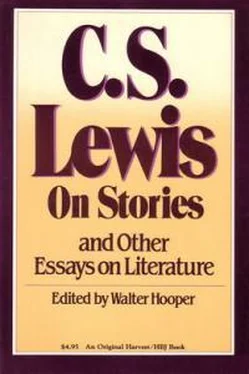To that extent the book is a specimen of the most scandalous escapism: it paints a happiness under incompatible conditions—the sort of freedom we can have only in childhood and the sort we can have only in maturity—and conceals the contradiction by the further pretence that the characters are not human beings at all. The one absurdity helps to hide the other. It might be expected that such a book would unfit us for the harshness of reality and send us back to our daily lives unsettled and discontented. I do not find that it does so. The happiness which it presents to us is in fact full of the simplest and most attainable things—food, sleep, exercise, friendship, the face of nature, even (in a sense) religion. That 'simple but sustaining meal' of 'bacon and broad beans and a macaroni pudding' which Rat gave to his friends has, I doubt not, helped down many a real nursery dinner. And in the same way the whole story, paradoxically enough, strengthens our relish for real life. This excursion into the preposterous sends us back with renewed pleasure to the actual.
It is usual to speak in a playfully apologetic tone about one's adult enjoyment of what are called 'children's books'. I think the convention a silly one. No book is really worth reading at the age of ten which is not equally (and often far more) worth reading at the age of fifty—except, of course, books of information. The only imaginative works we ought to grow out of are those which it would have been better not to have read at all. A mature palate will probably not much care for crême de menthe : but it ought still to enjoy bread and butter and honey.
Another very large class of stories turns on fulfilled prophecies—the story of Oedipus, or The Man who would be King , or The Hobbit . In most of them the very steps taken to prevent the fulfilment of the prophecy actually bring it about. It is foretold that Oedipus will kill his father and marry his mother. In order to prevent this from happening he is exposed on the mountain: and that exposure, by leading to his rescue and thus to his life among strangers in ignorance of his real parentage, renders possible both the disasters. Such stories produce (at least in me) a feeling of awe, coupled with a certain sort of bewilderment such as one often feels in looking at a complex pattern of lines that pass over and under one another. One sees, yet does not quite see, the regularity. And is there not good occasion both for awe and bewilderment? We have just had set before our imagination something that has always baffled the intellect: we have seen how destiny and free will can be combined, even how free will is the modus operandi of destiny. The story does what no theorem can quite do. It may not be 'like real life' in the superficial sense: but it sets before us an image of what reality may well be like at some more central region.
It will be seen that throughout this essay I have taken my examples indiscriminately from books which critics would (quite rightly) place in very different categories—from American 'scientifiction' and Homer, from Sophocles and Märchen , from children's stories and the intensely sophisticated art of Mr. de la Mare. This does not mean that I think them of equal literary merit. But if I am right in thinking that there is another enjoyment in Story besides the excitement, then popular romance even on the lowest level becomes rather more important than we had supposed. When you see an immature or uneducated person devouring what seem to you merely sensational stories, can you be sure what kind of pleasure he is enjoying? It is, of course, no good asking him . If he were capable of analysing his own experience as the question requires him to do, he would be neither uneducated nor immature. But because he is inarticulate we must not give judgement against him. He may be seeking only the recurring tension of imagined anxiety. But he may also, I believe, be receiving certain profound experiences which are, for him, not acceptable in any other form.
Mr. Roger Green, writing in English not long ago, remarked that the reading of Rider Haggard had been to many a sort of religious experience. To some people this will have seemed simply grotesque. I myself would strongly disagree with it if 'religious' is taken to mean 'Christian'. And even if we take it in a sub–Christian sense, it would have been safer to say that such people had first met in Haggard's romances elements which they would meet again in religious experience if they ever came to have any. But I think Mr. Green is very much nearer the mark than those who assume that no one has ever read the romances except in order to be thrilled by hair–breadth escapes. If he had said simply that something which the educated receive from poetry can reach the masses through stories of adventure, and almost in no other way, then I think he would have been right. If so, nothing can be more disastrous than the view that the cinema can and should replace popular written fiction. The elements which it excludes are precisely those which give the untrained mind its only access to the imaginative world. There is death in the camera.
As I have admitted, it is very difficult to tell in any given case whether a story is piercing to the unliterary reader's deeper imagination or only exciting his emotions. You cannot tell even by reading the story for yourself. Its badness proves very little. The more imagination the reader has, being an untrained reader, the more he will do for himself. He will, at a mere hint from the author, flood wretched material with suggestion and never guess that he is himself chiefly making what he enjoys. The nearest we can come to a test is by asking whether he often re–reads the same story.
It is, of course, a good test for every reader of every kind of book. An unliterary man may be defined as one who reads books once only. There is hope for a man who has never read Malory or Boswell or Tristram Shandy or Shakespeare's Sonnets : but what can you do with a man who says he 'has read' them, meaning he has read them once, and thinks that this settles the matter? Yet I think the test has a special application to the matter in hand. For excitement, in the sense defined above, is just what must disappear from a second reading. You cannot, except at the first reading, be really curious about what happened. If you find that the reader of popular romance—however uneducated a reader, however bad the romances—goes back to his old favourites again and again, then you have pretty good evidence that they are to him a sort of poetry.
The re–reader is looking not for actual surprises (which can come only once) but for a certain ideal surprisingness. The point has often been misunderstood. The man in Peacock thought that he had disposed of 'surprise' as an element in landscape gardening when he asked what happened if you walked through the garden for the second time. Wiseacre! In the only sense that matters the surprise works as well the twentieth time as the first. It is the quality of unexpectedness, not the fact that delights us. It is even better the second time. Knowing that the 'surprise' is coming we can now fully relish the fact that this path through the shrubbery doesn't look as if it were suddenly going to bring us out on the edge of the cliff. So in literature. We do not enjoy a story fully at the first reading. Not till the curiosity, the sheer narrative lust, has been given its sop and laid asleep, are we at leisure to savour the real beauties. Till then, it is like wasting great wine on a ravenous natural thirst which merely wants cold wetness. The children understand this well when they ask for the same story over and over again, and in the same words. They want to have again the 'surprise' of discovering that what seemed Little–Red–Riding–Hood's grandmother is really the wolf. It is better when you know it is coming: free from the shock of actual surprise you can attend better to the intrinsic surprisingness of the peripeteia .
Читать дальше











